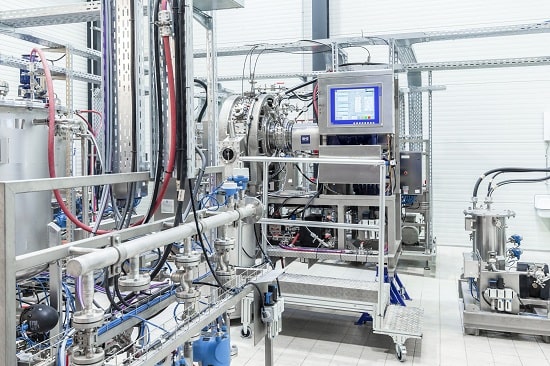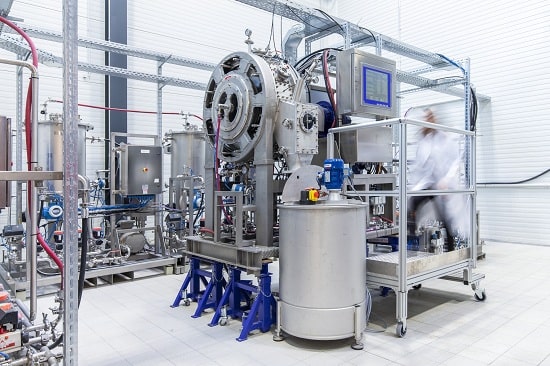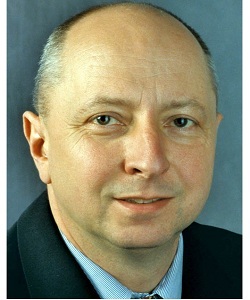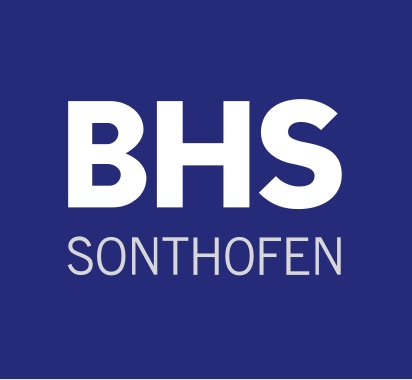BHS-Sonthofen offers a modular pilot plant for solid-liquid separation
Instability on markets and greater frequency of product changes are two of several trends that promote the demand for flexible systems in the fine chemical and pharmaceutical industries. Modular production systems enable shorter market introduction times and accelerated engineering phases. BHS-Sonthofen now has implemented a new plant concept for solid-liquid separation. The result is a modular pilot plant that includes a rotary pressure filter.
The process industry has been discussing modular plant concepts for years. But the demand for greater flexibility in production plants is now becoming louder, especially in the fine chemicals and pharmaceutical industries, as pressure from the markets increases. In these industries, speed is now an important competitive advantage. An existing plant needs to be as flexible as possible if it is to be reused for new or modified products. This is where modular concepts offer tremendous potential.[1]
Shorter time to market, greater mobility
More specifically, modular design means that individual, easily exchangeable modules can be assembled to create multipurpose plants. This can substantially shorten market introduction times. Modular production concepts also open up new possibilities in terms of plant mobility. The plants are compact enough, for instance, to move the production of pharmaceuticals to another location in the event of an epidemic.
BHS-Sonthofen supports companies when converting to continuous production. Together with the user, the company implements solutions for the reaction, filtration, and drying process steps in the Process Technology division. BHS has more than 65 years of experience in filtration technology. The company has now installed a modular system in its in-house test center, which greatly simplifies product changes. The plant is suitable for tests on-site at the customer’s premises as well as for small-scale production. Compared to conventional plant concepts, the installation costs are considerably reduced if the customer rents the plant for testing.
In addition to the filter, the plant consists of four structurally identical modules that can be exchanged according to requirements. These include the station for supplying the suspension and two modules for washing and for the cloth washing liquid. The rotary pressure filter of type RPF P01, which is a separate module, is the centerpiece of the plant.
The rotary pressure filter of type RPF P01 for tests and small-scale production
The rotary pressure filter works continuously. These filters of type RPF facilitate continuous filtration of suspensions in complex production processes. A large number of process steps occur during a single rotation of the drum, such as separating the slurry into filtrate and filter cake, single or multi-stage cake washing, suspension, solvent exchange, steaming, extraction as well as mechanical or thermal cake dehumidification. All of these process steps take place in separate, pressure-tight segment zones within the filter. This also allows the cake to be discharged directly to the surrounding area at atmospheric pressure without the need for separate pressure compensation via pressure locks, for instance.
The rotary pressure filter of type RPF P01 is the smallest size, with a filter surface of 0.18 m², making it particularly suitable for pilot tests in preparation for the process as well as for small-scale production. The identical design ensures that the settings are fully scalable to larger production filters at a later stage and thus facilitates the development of large-scale production systems for chemical and pharmaceutical applications.
Filter cake thicknesses of 5 mm to 100 mm, operating temperatures from -20°C to 160°C, and operating pressures of up to 6 bar are supported, depending on the design. In contrast to one-off pilot production installations, the pilot rotary pressure filter supports long-term testing under continuous, actual production conditions. Pressure is generated hydraulically in all process steps by feeding suspension, wash liquids, or extraction agents. In this way, each step in the process can be individually optimized. Moreover, this functional principle – which is applied across the entire range of products – results in a particularly low resource usage.
Data-driven process optimization
Operational reliability is ensured through the intelligent use of process data. This system offers the possibility of measuring the cake thickness in order to operate the filter as efficiently as possible with regard to throughput capacity and efficiency of the cake washing. It is important that the cells are filled as completely as possible, without causing any overfilling. The filter speed is controlled with the continuous cake thickness measurement as a control variable. In this case, this means that the cake thickness always corresponds to the setpoint. The cake thickness measurement enables optimized operating conditions independent of fluctuations in the amount of solids added.

Flexibly exchange modules
The design of the peripheral stations for the feed media for suspension, washing, and cloth liquid are the same and can be used variably depending on the required process. For example, there are applications in both the pharmaceutical and chemical sectors where counterflow washing is used. In this case several washing modules of the plant are used. On the other hand, one washing module can be deactivated if an application only requires a simple washing of the filter cake. The interfaces between the modules can also be designed flexibly. The stations are connected to each other by hoses or pipes during installation.
All stations can also be equipped with pumps and agitators as required. Each station is equipped with the necessary measuring instruments and control valves. These include flow meters, devices for recording the fill levels in the tanks, and temperature measurement. The plant also includes stations for collecting the filtrates, for the gas flow into the drying zones, for recovery of the cloth washing liquid, and for separating the washing liquid from the drying filtrates.
Test center or deployment on-site
BHS installed the pilot plant in its new test center in Sonthofen, Germany, in order to carry out design tests for customers and to investigate the filtration behavior of the respective material in detail. The plant can also be rented for deployment at the customer’s premises and can be configured precisely for the application. In turn, this provides a technology for a wide range of applications, while reducing investment risks, as well as being tailored to market requirements in the coming years.
Reference
[1] See the ProcessNet initiative’s whitepaper entitled “Modular Plants.”

















![Sirio Launches Global Research Institute for Longevity Studies [SIA]](https://www.worldpharmatoday.com/wp-content/uploads/2019/09/Sirio-218x150.jpg)




